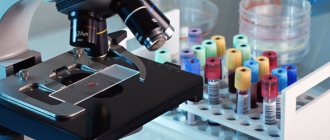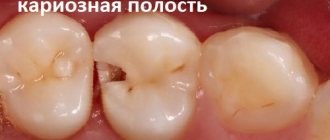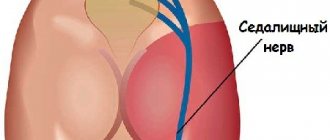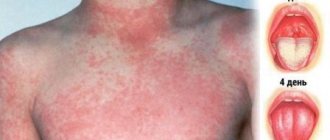Symptoms of stomach ulcer
In the early stages, a stomach ulcer may be asymptomatic. Patients may not be aware of their illness until an exacerbation occurs. In addition, symptoms often resemble other diseases of the gastrointestinal tract.
What symptoms will be the first?
- pain syndrome. Pain appears in the epigastric region, spreads to the thoracic region, under the left shoulder blade and lumbar region. Pain appears immediately after eating, or after 1-2 hours. At the height of pain, there may be vomiting of acidic contents, which brings relief.
- heartburn;
- white coating on the tongue;
- slight increase in body temperature;
- bloating, constipation, feeling of heaviness after eating;
- change in appetite - a decrease in food eaten is associated with fear of pain.
What is a stomach ulcer?
With a stomach ulcer, a defect forms on the wall of the organ - an area of damage to the mucous membrane with glandular ducts, vessels, and sometimes the submucosal layer. Localization and depth may vary.
The disease is accompanied by pain in the upper abdomen that occurs after eating. Depending on where the ulcer is located, they can radiate to the chest, scapula, spine, or hypochondrium. In addition to this symptom, dyspeptic disorders often occur: heartburn, regurgitation of food, nausea, sour belching, constipation. In severe cases, vomiting may occur.
Diagnosis of a stomach ulcer includes the collection of complaints and medical history, general and biochemical blood tests, stool analysis for occult blood, ultrasound, radiography, FEGDS, biopsy of an area of damaged tissue, as well as methods to determine the presence of bacteria.
Depending on the stage of the disease, treatment can be conservative (medicines, folk remedies, physiotherapy) or surgical. In the absence of timely medical care, a stomach ulcer can lead to bleeding, perforation in the organ wall, and cancer.
Causes
The gastric mucosa is the helper and protector of the stomach. It prevents damage to the organ, as hydrochloric acid is actively produced, protecting the stomach from environmental influences and rough foods.
In this case, there may not be enough mucus, then the aggressive environment has the opportunity to penetrate the protective layer and attack the walls of the digestive organ. This is how an ulcer forms. What thins this mucous layer?
1. Helicobacter Pylori bacterium. Under favorable conditions for the bacterium, it has a destructive effect on the gastric mucosa, bypassing local protective factors. As a result, in the absence of timely treatment, a defect appears - an ulcer.
2.Use of non-steroidal anti-inflammatory drugs. Due to prolonged and uncontrolled use of such drugs, “medicinal” stomach ulcers occur.
3. Increased acidity - develops as a result of increased secretion of hydrochloric acid, which has a corrosive effect on the gastric mucosa, with the subsequent formation of a defect.
4. Other provoking factors:
- smoking; - burdened heredity;
— violation of diet;
- alcohol; - frequent stress.
How to understand that you have a peptic ulcer
The most common symptom is burning pain in the abdomen, which has certain characteristics:
- begins between meals or at night,
- stops if you eat or take an antacid,
- lasts from several minutes to several hours,
- appears and disappears for several days or even weeks.
- Sometimes, with a peptic ulcer, appetite deteriorates, sour belching and nausea appear, blood in the stool (black stool). Vomiting may occur and weight loss may occur.
Even if the symptoms are mild, you should consult a doctor as soon as possible. You cannot delay - if left untreated, the disease will gradually worsen and complications may arise: bleeding from ulcers or even perforation of the ulcer (a hole will appear in the wall of the stomach). In this situation, surgery is required.
It can be difficult to differentiate peptic ulcers from other problems based on symptoms alone. Similar symptoms are caused by any type of inflammation in the stomach, from the simplest superficial gastritis to the terrible and dangerous stomach cancer.
If you don’t go to the doctor for a long time, eventually the body stops signaling, the stomach loses sensitivity and the symptoms disappear. But the “silent” inflammation remains and continues to burn through the stomach wall. This happens if a person suffers, abuses alcohol, or is under severe stress.
What is the danger of stomach ulcers?
It is very important to make a correct diagnosis in the early stages of the disease, otherwise complications may develop.
1. Perforation (perforation) of an ulcer - occurs as a result of the destruction of all layers of the stomach, after which the contents of the stomach exit through the through hole, which leads to the development of peritonitis.
2. Ulcerative bleeding - occurs as a result of corrosion of a vessel in the stomach wall at the level of the ulcer. Bleeding leads to loss of circulating blood volume and the possible development of shock.
3.Malignancy of an ulcer is a rare complication when a malignant tumor forms from an ulcer.
4.Perigastritis – leads to deformation of the stomach. It develops as a result of reaching the zone of inflammation around the ulcer, the serous membrane of the stomach, forming adhesions between adjacent organs.
5. Penetration of an ulcer is the penetration of an ulcer through the wall of the stomach into nearby organs.
6. Stenosis of the pyloric part of the stomach - a complication develops if the ulcer is localized in this area. As a result, food does not pass from the stomach to the intestines.
Complications
If left untreated, stomach ulcers can cause serious consequences, including death. The most common complications:
- If the acute form of the disease is not treated in a timely manner, it quickly becomes chronic. Patients with chronic peptic ulcer undergo a course of treatment twice a year to stop the next exacerbation;
- neighboring organs adhere to the stomach. With chronic gastric ulcers, gradual destruction of the gastric walls occurs. Neighboring organs, such as the liver, may stick to the stomach and the inflammatory process will spread further;
- perforation (perforation). In this condition, the walls of the mucous layer of the gastric walls become thinner, and a through hole is formed through which the masses contained in the stomach penetrate into the abdominal cavity. Peritonitis begins, which is extremely life-threatening;
- penetration. The destruction of the gastric walls occurs, and the ulcer spreads to the organ located below (usually the pancreas). This condition is accompanied by acute pain (of a regular nature) and a significant increase in temperature;
- bleeding. Minor bleeding with peptic ulcer is considered normal for the course of the disease. However, sometimes blood loss occurs, which can be fatal. Most often, bleeding occurs from destroyed arteries, less often from veins and capillaries. The patient begins to vomit, the vomit is dark brown in color. Black stool;
- stomach cancer. Malignancy of gastric ulcer is a rare phenomenon, but possible. Callous ulcers are considered the most dangerous. With the formation of malignant tumors, there is a decrease in appetite and sudden weight loss;
- pyloric stenosis. It is considered the most dangerous complication, the risk of which increases with frequent relapses of the ulcer. Occurs when the pyloric region of the stomach is affected. With stenosis, a narrowing is formed that interferes with the movement of food into the stomach. Nausea with vomiting, belching, and sudden weight loss are observed.
What to do at the first symptoms
An ulcer is a serious disorder of the inner lining of the stomach. Its occurrence is promoted by: junk food, poor diet, stress, smoking, alcohol abuse, parasites. If the process is started without paying attention to the symptoms of a stomach ulcer, then this can lead to serious problems in the future.
On the other hand, if you do not bring the disease to a deplorable state and promptly recognize the first signs of a stomach ulcer, then the chances of restoring stomach health will increase significantly. It is the early detection of symptoms that will allow you to get rid of ulcerative defects quickly and without serious consequences.
When the first symptoms appear, you should consult a gastroenterologist.
Prevention
To prevent stomach ulcers, you need to follow a diet and follow several recommendations:
- elimination of bad habits (smoking, alcohol abuse);
- regular meals 5-6 times during the day;
- avoidance of foods that increase the level of acidity in the gastric juice and irritate the mucous layer;
- eliminating stress;
- timely cure of pre-ulcerative condition (chronic gastritis).
List of references: https://ru.wikipedia.org/wiki/Stomach_ulcer https://www.gmsclinic.ru/gms/press/articles/art-yazvennaya-bolezn-zheludka-prichiny-zabolevaniya-metody-lecheniya-i- profilaktiki https://fnkc-fmba.ru/zabolevaniya/yazvennaya-bolezn-zheludka-i-12-perstnoy-kishki/ https://www.msdmanuals.com/ru/professional/diseases-gastrointestinal-tract/gastritis -and-peptic-ulcer/ulcer-disease https://www.gb40.ru/services/hirurgiya/page/yazva_jeludka/ https://aksis-med.ru/spravochnik/yazvennaya-bolezn-zheludka/ https:// www.cochrane.org/ru/CD011523/UPPERGI_medicamentoznoe-ili-operativnoe-lechenie-pri-yazvennoy-bolezni-zheludka-i-verhnih-otdelov-tonkoy B.B. Dauletbaeva, A. Amankeldikyzy, D.B. Beskempirova, Zh.B. Bolaeva, A.S. Zhumanova, A.N. Kalieva, Zh. Rysbay Peptic ulcer of the stomach and duodenum // Bulletin of KazNMU. 2020. No. 2. https://www.gosmed.ru/lechebnaya-deyatelnost/spravochnik-zabolevaniy/gastroenterologiya-bolezny/yazvennaya-bolezn-zheludka-ili-dvenadtsatiperstnoy-kishki/ https://www.nrmed.ru/rus/dlya-vzroslykh/ gastroenterologiya/yazvennaya-bolezn/ https://www.kp.ru/guide/simptomy-jazvy-zheludka.html https://minzdrav.tatarstan.ru/rus/index.htm/news/156516.htm https:// www.1spbgmu.ru/images/home/universitet/Struktura/Kafedry/Kafedra_terapii_fakultetskoy/lektsii/gastroenterology3.pdf https://medelite.ru/gastro/ulcer.php Notes from the author of the article, based on personal experience. This material is purely subjective and is not a guide to action. Only a qualified specialist can determine an accurate diagnosis and prescribe treatment.
Last modified: 03/18/2020
Prevention and prognosis for gastric ulcers
The prognosis is usually favorable if the diagnosis was made in a timely manner and there are no complications.
Prevention of gastric ulcer implies the elimination of factors leading to the development of this disease, as well as careful attention to the state of your health if you have a genetic predisposition to it.
Even if nothing worries you, it is recommended to undergo regular preventive examinations with a gastroenterologist in the following cases:
- if infected with the bacterium Helicobacter pylori;
- for ulcers in close relatives;
- if you have bad habits;
- with increased stomach acidity;
- with frequent exposure to stress;
- in case of non-compliance with the diet;
- in the presence of any gastrointestinal diseases.
Treatment
A stomach ulcer, the treatment of which must be complex, requires professional therapy. The prescription of a treatment regimen for patients suffering from peptic ulcer disease is carried out taking into account their individual predispositions, existing symptoms, and stage of the disease.
The most effective therapy is complex drug treatment. An important feature is the absence of significant differences in restorative therapy for gastric ulcers and duodenal ulcers.
First of all, it is necessary to follow a diet (will be described below), which is a prerequisite for therapy if the digestive system is affected by a stomach ulcer. Treatment is based on strict adherence to dietary instructions, drug treatment and complete restriction from stressful psycho-emotional outbursts.
The isolated use of one of the above components does not guarantee recovery, but has a short-term positive effect on the disease.
Treatment of stomach ulcers is based on several important principles:
- It is necessary to achieve an active direct impact on the main cause of gastric ulcer development - gastritis caused by the bacterium Helicobacter pylori, taking medications, other diseases, weakened immunity due to poisoning or other factors.
- Medicines should be selected taking into account the patient’s pathological complications and concomitant ailments.
- Mandatory compliance of therapy with the individual characteristics of the patient. You should check for existing allergic reactions, tolerance of the main components, and biometric data.
- Following all instructions for treatment and following the regimen.
- A diet containing mechanical and chemical products that are positive for the mucous membrane is prescribed.
- Phytotherapy and physiotherapeutic procedures are allowed. Sometimes specialists purposefully influence local manifestations of the disease.
Treatment of a stomach ulcer should not be carried out independently; all prescriptions, therapy and monitoring of the patient’s condition should be carried out by a qualified doctor!
Drugs
The treatment may be triple therapy or the more innovative quadruple therapy.
The classic treatment regimen for stomach ulcers using three active drugs is based on:
- De-Nol.
- A group of powerful antibiotics: ampicillin, clarithromycin, tetracycline and amoxycycline.
- Antiprotozoal agents, for example Metronidazole.
With a more comprehensive approach, additional drugs are used that are responsible for a gradual decrease in the amount of hydrochloric acid - the main negative factor that causes stomach ulcers. Treatment also includes the use of other drugs.
Often, specialists prescribe patients to take additional medications that can increase the effectiveness of treatment and eliminate the discomfort that a stomach ulcer causes. In this case, the symptoms bother the patient less. The list of these drugs looks like this:
- Antacid medications - characterized by the ability to envelop the damaged area with protective secretions, also eliminate excessive heartburn, fight belching and reduce other symptoms. Medicines: Reni, Maalox, sometimes Gaviscon is prescribed.
- Selective anticholinergics are responsible for increasing the positive effect of antacids, reduce the amount of hydrochloric acid, and help relax the gastrointestinal tract muscles. The best representative of this class is Platyfillin in the form of injections.
- Antispasmodic drugs No-Shpa, Spazmalgon. They reduce the tone of the gastrointestinal tract muscles and allow them to relax.
- Reparants. They act as supportive medications that provide additional nutrition to damaged cells and are characterized by a wound-healing effect.
- Gastroprotectors De-Nol. Their composition is based on bismuth salts, they have a positive effect on reducing inflammation, complement the action of antibiotics, and accelerate the treatment of stomach ulcers.
The use of these methods for treating stomach ulcers is characterized by an 85% recovery rate. With a positive outcome, scarring of the ulcer and complete healing of the damaged area are observed in the stomach cavity.
Medicines that will help with exacerbation
Depending on the complexity of the current form of peptic ulcer (the most severe is the deep form, affecting the muscles of the stomach and membranes), several types of medications are used. In most cases of early stage manifestations, it is recommended to use antacids - drugs that can reduce the level of destructive hydrochloric acid.
The simplest representatives of this group of drugs are considered to be ordinary baking soda or the common sodium bicarbonate. The advantage of these medications in the treatment of stomach ulcers is their rapid positive effect; the active components almost instantly reduce heartburn and other unpleasant symptoms. Temporary changes in the alkaline nature are possible due to the residual amount of soda not dissolved in the stomach.
Calcium carbonate can be used, which has a stronger healing effect. However, the negative impact is also great - a state of serious fecal obstruction may occur.
Treatment of stomach ulcers and reduction of negative symptoms can also be achieved with other drugs. Blockers of gastric secretory function have positive popularity. The active ingredient is cimetidine. It helps to naturally block the production of hydrochloric acid and is the main component for many effective drugs.
As a comprehensive treatment for gastric ulcers, it is possible to prescribe medications that block the secretion of several organs of the body. They can not only reduce the production of hydrochloric acid, but also affect the functioning of nearby organs, which makes it possible to equalize the negative effects of powerful drugs.
Cytoprotectors, which are responsible for increasing the protective properties of existing secretory cells of the mucous membrane, have a specific effect. Medicines created on the basis of active bismuth for the treatment of stomach ulcers are characterized by a complex effect on the disease. They simultaneously fight the causes of ulcers and restore protective abilities at the cellular level.
Surgery
In case of complications of a stomach ulcer and the impossibility of conservative therapy to save the patient’s life, surgery to remove the stomach ulcer may be prescribed.
Such radical actions may be due to the following factors:
- Perforation of the stomach walls.
- Spread of the ulcer to surrounding organs.
- Stenosis of the duodenal bulb or pyloric stenosis.
Surgery may also be prescribed if there is a significant deterioration in the patient’s symptoms and general condition or if there is no result from drug therapy.












